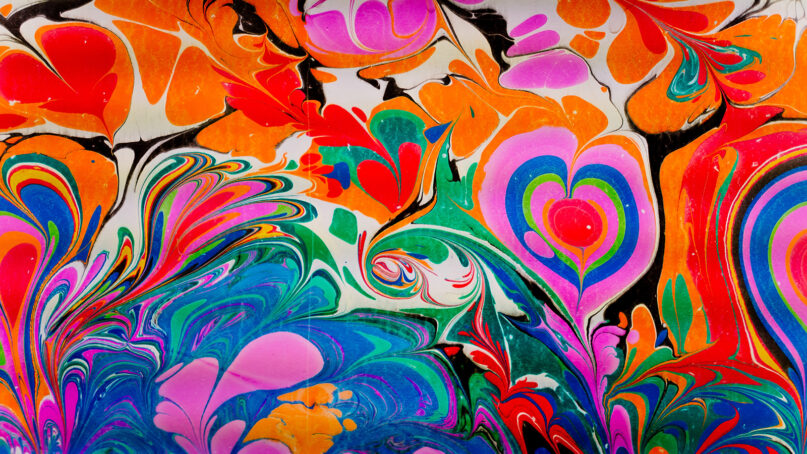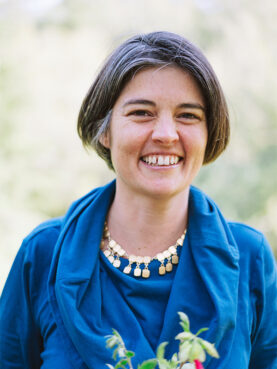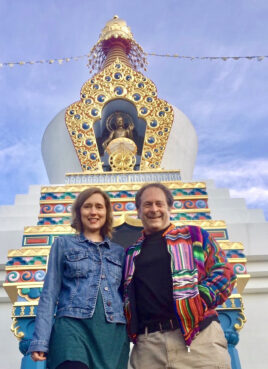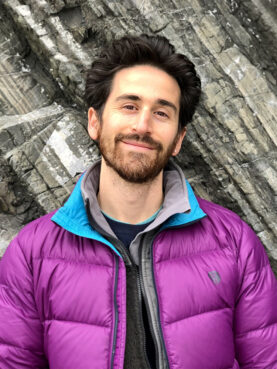Psychedelic chaplains: In clinical trials, a new form of spiritual guide emerges
Spiritual care practitioners are being trained to support patients undergoing psychedelic therapy in clinical trials and decriminalized settings.

(RNS) — Moana Meadow was 22 when her grandmother died in a hospital room, sitting up, eyes open, gripping the hands of her family members.
“Her spirit left her body like that. In an instant,” she said. “I wasn’t religious, but her spirit felt like it was hovering in the room for 15 minutes. There was this energy, pulsating. I’ve never experienced anything like that before.”
The event, though painful, left an imprint on Meadow and convinced her to pursue the life of an interfaith chaplain so she could accompany others who were dying.
Now, the hospice chaplain is interested in helping people through other transitions — the perceptual changes brought on by psychedelic drugs. “Being with people in altered states of consciousness” can be similar to pivotal moments like marriage, childbirth or death, Meadow said, and she is on a mission to bridge chaplaincy and the work of accompanying people who are under the influence of psychedelics.
“Psychedelic experiences, particularly at higher dosages, can feel like dying,” said Sam Shonkoff, assistant professor of Jewish studies at Graduate Theological Union in Berkeley, California. “One can feel as if they’re being born. One can feel a sense of existential rupture. To have a chaplain there, who maybe has a lot of experience with sitting with people who are facing death, that can be really applicable to accompanying people who are having these experiences with psychedelics.”
Since the mid-aughts, a tidal wave of scientific research on psychedelics has flooded academic journals with evidence that these substances may be able to provide relief for everything from smoking addiction to anxiety and depression. These benefits arise at least in part, some psychedelic researchers argue, from the mystical or spiritual encounters the drugs can induce.

Moana Meadow. Photo by Julia Maryanska
“As the scientific research on spiritual experience with psychedelics has started to come out so strongly,” said Meadow, “I think people are beginning to understand or admit the importance of religious training and knowledgeability in psychedelic work.”
As a result, academic institutions across the U.S. are launching training programs in which spiritual practitioners can become qualified psychedelic facilitators, paving the way for a new field of psychedelic chaplaincy.
Current opportunities for these roles are limited in the U.S., as the use of the drugs themselves is considered experimental. Ketamine, a powerful but relatively safe anesthetic, is legal for medical use, and some health care chaplains act as facilitators for ketamine-assisted therapy, which has shown promise for relieving depression. As researchers have begun conducting clinical trials for psychedelic treatments, too, they are recruiting chaplains.
The Rev. Caroline Peacock, an ordained Episcopal priest and a chaplain for Emory Healthcare in Atlanta, will be serving as a spiritual health clinician in a clinical trial assessing whether psilocybin might help treat anxiety, depression and chronic pain experienced by cancer survivors.
In these settings, psychedelic chaplains are asked to provide spiritual care for clients before, during and after a psychedelic dose, aiding them as they work to elicit meaning from the experience.
“Some of the questions psychedelic chaplaincy is bringing to the table are some of the oldest questions of all,” said Shonkoff, who pointed out that Indigenous shamans, medicine women and elders have been doing this work for centuries. But the presence of a psychedelic chaplain on these scientific teams is something new.

Jamie Beachy, left, with Rick Doblin, the founder of MAPS, at the MAPS MDMA training center in Red Feather Lakes, Colorado, in May 2019. Courtesy photo
Jamie Beachy, a chaplain by training and the director of education for the Center for Psychedelic Studies at Naropa University in Boulder, Colorado, joined a study looking at MDMA, also known as the recreational drug ecstasy, as an aid for treatment-resistant post-traumatic stress disorder. The research, led by the Multidisciplinary Association for Psychedelic Studies, shows that 67% of participants taking MDMA no longer meet the criteria for PTSD, compared with 32% of participants in the placebo group.
“I have been compelled to see how people are able to move through traumas in a way that I wasn’t seeing in the hospital or the trauma settings I was working in,” said Beachy, a former health care chaplain.
Beachy said chaplains, who are often “present to traumas unfolding in real time,” can help clients navigate events that could disrupt their existing belief systems, something psychedelic therapy patients may face. “In one of the Johns Hopkins studies of DMT — another powerful psychedelic — people that went into the study reporting that they were atheists apparently came out of the study feeling less connected with atheism,” Beachy told RNS.
Beachy is developing a degree concentration in psychedelic care for the Master of Divinity program at Naropa, which already offers a psychedelic-assisted therapies certificate for professionals.
Meadow, meanwhile, is program director of a new psychedelic facilitator certification program at the UC Berkeley Center for the Science of Psychedelics, aimed at people who are already professionals in spiritual care and health care. Graduates may be eligible to apply for a Psilocybin Facilitator License in Oregon or Colorado, which recently decriminalized psilocybin. Religious professionals would be able to act as psychedelic chaplains in health care or research settings where regulations permit.
“At the program that I’m running at UC Berkeley, there’s a clear value on the spiritual aspects of psychedelic work,” said Meadow. “So we’re attracting chaplains to our training program and promoting their expertise in this field as well.”

Sam Shonkoff. Courtesy photo
At both UC Berkeley and Naropa, the programs emphasize the Indigenous roots of many psychedelic practices, which Shonkoff celebrates. “There has been a tendency in this burgeoning field of psychedelic study to try to talk about the so-called mystical aspects of psychedelics without reference to particular cultural and spiritual traditions that have used these substances,” he said.
As states decriminalize psychedelics, said Ron Cole-Turner, professor emeritus at Pittsburgh Theological Seminary who often writes on theology and psychedelics, recreational, ceremonial and religious uses for psychedelics will likely expand.
“Give us a decade, and I can’t imagine we won’t have well-established opportunities in multiple parts of the United States, definitely Oregon, very likely Colorado and other places … where there will be open, out, legal and reasonably well-supervised and therefore safe pathways for people who just simply want to see if this enriches their spiritual lives,” he told Religion News Service.
Chaplains will be necessary for these grassroots uses as well, said Celina De Leon, founder and director of the Circle of Sacred Nature 501(c)3 Church, based in California’s Bay Area, for which taking ayahuasca is a “sacramental practice” that is a “fundamental expression of our religious beliefs,” De Leon told RNS.
While De Leon views these substances as having “beautiful potential,” she readily acknowledges that not all psychedelic experiences are positive. “Sometimes psychedelic experiences can be very challenging, and people can really benefit from having support in their meaning making process,” she said. “I think chaplains can be very well suited for that on a community level, outside of clinical contexts.”
Some people, De Leon adds, have destabilizing encounters — the colloquial “bad trip” — and because of a person’s vulnerability during psychedelic therapy, there can also be safety risks.
Currently, there’s no standard pathway for becoming a psychedelic chaplain. Beachy would like to see nondegree programs like Naropa’s be complemented by a national advanced certification for psychedelic chaplains, similar to those that certify chaplains in palliative care or ethics consultation.
The first wave of psychedelic chaplains is already here, however, reconnecting the link between psychedelics and religion, as science reconnects the link between the drugs and health.
“Psychedelics have traditionally been medicines that were used for spiritual growth, healing and prayer,” said Meadow. “If we’re not thinking about them that way, we are missing something very important.”
No comments:
Post a Comment